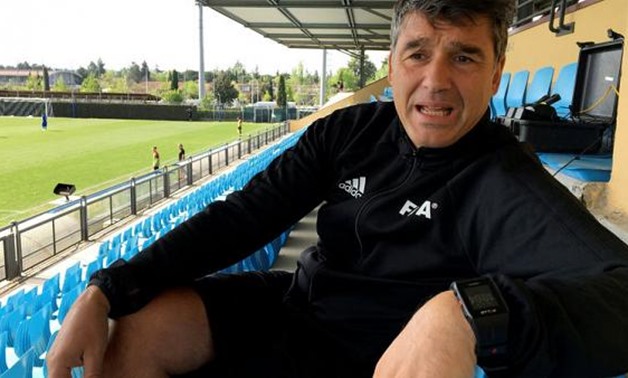
FIFA's head of refereeing, Massimo Busacca, explains the benefits of the video replay system during an interview with Reuters, held during a seminar for World Cup referees in Florence, Italy April 19, 2018. REUTERS/Brian Homewood
FLORENCE, Italy, April 20 (Reuters) - Massimo Busacca still remembers the sleepless nights.
FIFA's director of refereeing was himself a match official for 15 years and knows how much suffering and soul-searching that referees go through after a bad performance.
"To understand what a referee's life is like, just try doing it once," the Swiss told Reuters in an interview. "Try it, just to see what it means to make a big mistake and be killed by the media the next day.
"I know how many hours I was looking up at the ceiling and I couldn't sleep because of my mistake... and I know that only one decision can change your life."
Busacca said that “a player can be very bad for 89 minutes and he scores a goal and suddenly he becomes a hero. A referee can be the best in the world for 89 minutes, he makes one mistake and he is killed."
For Busacca, the video technology system (VAR) which will be used at this year's World Cup in Russia to help referees, is a much-needed safety net that could end their purgatory.
"Please let us have VAR for these moments," he told Reuters on the sidelines of a training camp for the European and African referees who will officiate in Russia. "Our careers and our lives have to change, they have to be fairer."
Busacca, whose own career included two World Cups and a Champions League final, remembered refereeing one "important" Champions League match where there was a sending-off offence but he was not sure which player had committed the foul.
He did not have VAR to turn to, so he did what he thought was the next best thing -- and asked the players involved.
"I said, please tell me who committed the foul because otherwise it could be my last game," he said. "The players were very fair... one owned up and I gave the red card."
IN THE DARK
Busacca said that, without VAR, players would quickly find out what television replays had shown while the referee remained in the dark.
"The players receive information from outside the pitch. Team staff are watching the match on an iPad, or the coach gets an SMS," he said.
"So the players tell you that you made a mistake, and how do you continue the game after that? What happens if there is another incident in the other penalty area? Do you compensate for the mistake?"
In the VAR system, a trained referee with access to a video monitor, and in constant communication with the main match official, checks decisions considered "match-changing".
If an obvious mistake is spotted, the incident can be reviewed and changed. The referee, who has access to a pitchside monitor, can also initiate a review himself.
The system has been trialled in several leagues around the world this season, including Serie A, the Bundesliga and the MLS, and was approved by soccer's law-making body IFAB in March.
But not everyone is happy.
'CONTROVERSIAL VAR'
One of the most frequent complaints is too many incidents are being reviewed. Busacca, however, said the last thing a referee wanted to do was consult the VAR.
"Like anyone else, referees don't like to be told they have made a mistake so the referee doesn't like having an onfield review. He doesn't want to go the pitchside monitor," he said.
And he warned that a referees' mistake would still be noted by FIFA even if the VAR helped make the right decision.
"Just because VAR has corrected you, it doesn't mean that you will easily be allocated another game," he said, adding that one review per match -- not including offsides -- was too many.
"That would mean we are not working well with referees any more," he said.
An impassioned Busacca said he could not understand some of the criticism of VAR.
"Why do I always see that phrase 'controversial VAR'?" he said. "Because a player is celebrating and it is discovered that he is offside?
"Of course, we have to be better, we have to reduce the time it takes, but, in the end, we need to get the decisions right."
European soccer's governing body UEFA has decided against using VAR in the Champions League next season, saying the system needs fine-tuning, but Busacca said it was ready for the World Cup.
“We have worked an incredible number of hours on the pitch in the last two years in seminars and tournaments,” he said.
“I close my eyes and think of the World Cup final in Moscow on July 15 and imagine that the game ends 1-0 with a goal which is 20 centimetres offside, and that I wouldn’t be able to sleep. And I can’t accept that.”


Comments
Leave a Comment